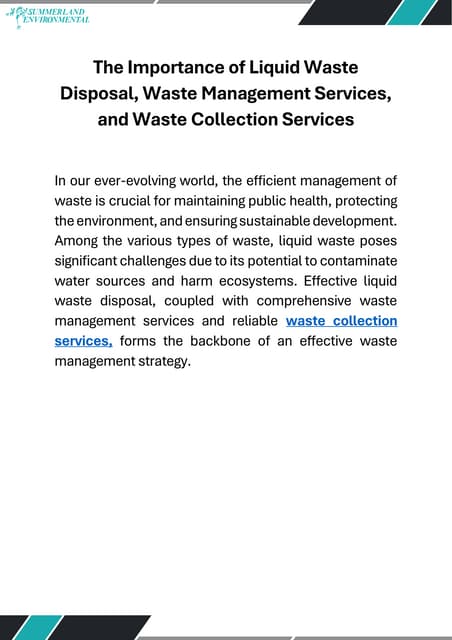What Does Reclaim Waste Do?
What Does Reclaim Waste Do?
Blog Article
Getting The Reclaim Waste To Work
Table of ContentsRumored Buzz on Reclaim WasteThe Facts About Reclaim Waste UncoveredEverything about Reclaim WasteHow Reclaim Waste can Save You Time, Stress, and Money.Not known Details About Reclaim Waste
Domestic sewer waste refers to the waste and products from a domestic septic tank. The correct monitoring and disposal of domestic sewer waste require liquid waste to be moved to a sewer treatment plant where the appropriate methods and devices are applied to detoxify and dispose of waste.
Commercial waste usually includes possible dangers, such as flammable products or a combination of liquid and solid waste items, and calls for a more innovative and comprehensive disposal process. The disposal of commercial waste generally includes the purification of waste prior to transport to guarantee risk-free and appropriate disposal. Hazardous waste is developed from byproducts and drainage of industrial processes and production.
This kind of waste can not utilize the very same sewage monitoring transport or processes as septic or business liquids. The hazardous waste administration process needs the inspection and testing of liquid waste before it undergoes the disposal process (industrial wastewater treatment). Runoff waste is the liquid waste that originates from drainage and excess stormwater in extremely booming locations or cities
Drainage waste can trigger contamination and flooding if not handled correctly. Guaranteeing proper waste management can prevent disasters and minimize environmental harm.
The Main Principles Of Reclaim Waste
Contact PROS Solutions today to find out regarding our waste monitoring and disposal services and the appropriate means to take care of the fluid waste you generate.
(https://disqus.com/by/reclaimwaste1/about/)Do you understand what takes place to your water when you end, purge the toilet or drain pipes the washing machine? No? Well, it deserves understanding. This so-called 'wastewater' is not just an important resource yet, after therapy, will certainly be launched to our land, waterways or the sea. Utilized water from toilets, showers, bathrooms, cooking area sinks, laundries and industrial procedures is called wastewater.

water used to cool down equipment or clean plant and tools). Stormwater, a kind of wastewater, is overflow that streams from farming and metropolitan locations such as roofs, parks, yards, roads, courses and rain gutters right into stormwater drains, after rainfall. Stormwater moves without treatment directly to local creeks or rivers, eventually reaching the sea.
The Best Guide To Reclaim Waste
In Queensland, the majority of wastewater is treated at sewage treatment plants. Wastewater is transported from domestic or industrial websites with a system of sewage systems and pump terminals, called sewerage reticulation, to a sewage treatment plant. Neighborhood governments build, maintain and operate most sewage treatment plants. Operators are certified under the Environmental Management Act 1994 to discharge treated wastewater at an acceptable ecological criterion right into rivers.
The Division of Natural Resources recommends local federal governments concerning handling, operating and preserving sewerage systems and treatment plants. In unsewered areas, city governments might require owners to set up individual or family sewer treatment systems to treat domestic wastewater from toilets, kitchens, bathrooms and laundries. The Division of Natural Resources authorizes the use of home systems when they are shown to be effective.
Most stormwater obtains no treatment. In some new class, therapy of some stormwater to get rid of trash, sand and gravel has begun using gross toxin catches. Wastewater therapy occurs in 4 phases: Gets rid of solid issue. Larger solids, such as plastics and various other objects mistakenly discharged to drains, are eliminated when wastewater is passed through displays.
Wastewater after that streams right into huge storage tanks where solids resolve and are removed as sludge. Grease and residue are skimmed from the surface. Utilizes tiny living microorganisms referred to as micro-organisms to damage down and eliminate staying liquified wastes and fine bits. Micro-organisms and wastes are integrated in the sludge. Removes nitrogen and phosphorus nutrients that could trigger algal flowers in our rivers and endanger water life.
The Facts About Reclaim Waste Uncovered
Nutrient elimination is not available at all sewage treatment plants because it requires expensive specialist equipment. It is ending up being extra usual in Queensland. Clear fluid effluent generated after therapy might still have disease-causing micro-organisms. If this effluent is launched right into rivers such Get More Information as rivers or the sea, the micro-organisms will at some point pass away out.

This generally means wastewater needs to be dealt with or pollutants removed prior to it can be released to waterways. Most wastewater flows right into the sewage system. Under the Act, local governments carry out authorizations and licences for ecologically relevant tasks (Ages) including wastewater releases that could have a regional impact. The division carries out authorizations and permits to Periods including wastewater releases that may have a local or statewide effect.
Rumored Buzz on Reclaim Waste
Tracking provides accurate information about water top quality and can verify that licence conditions are being satisfied. The info acquired through tracking supplies the basis for making water quality decisions.
Report this page